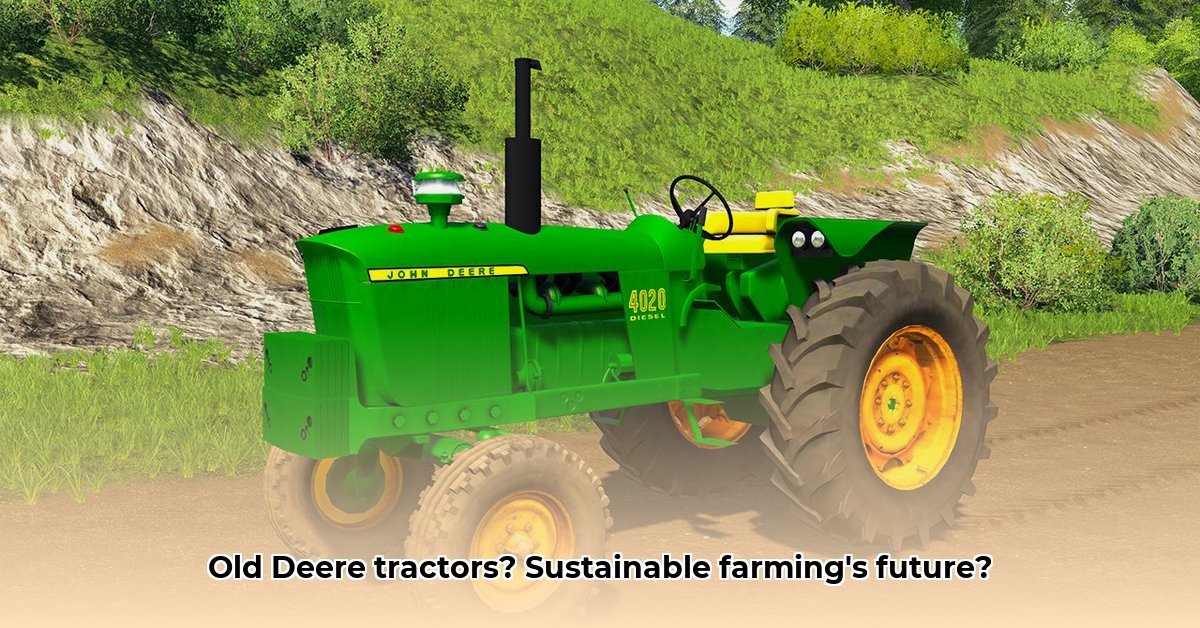
fs19 Old John Deere Tractor Mods: A Virtual Window into Sustainable Farming's Past and Future
Farming Simulator 19 (FS19) and its popular old John Deere tractor mods offer more than just nostalgic fun; they provide a unique lens through which to examine the evolution of farming technology and its impact on sustainability. By virtually operating these older machines, we gain insights into their mechanics, fuel efficiency, and environmental consequences, laying the groundwork for understanding the advancements toward more sustainable practices. The stark contrast between the fuel consumption of a 1950s virtual tractor and a modern counterpart vividly illustrates the progress in efficiency achieved over decades. This isn’t mere nostalgia; it's a historical perspective on technological evolution in agriculture. For more information on John Deere tractors, check out this resource.
How significant is the efficiency improvement between older and modern models, and how does this translate to reduced environmental impact? Analyzing older designs reveals how seemingly minor design choices – engine type, tire size – significantly impacted fuel efficiency and environmental footprint, highlighting the leap forward represented by precision agriculture.
Precision Farming: Making Every Drop Count
Precision agriculture, enabled by modern John Deere tractors equipped with GPS, sensors, and auto-steer, is revolutionizing resource management. These technologies allow farmers to target resources with precision, minimizing waste and environmental impact. This contrasts sharply with the manual operations of older models in FS19, underscoring the significant advancements in environmentally sound farming. However, the virtual world of FS19 also reveals the challenges of transitioning to data-driven methods.
What percentage of farms currently utilize precision agriculture technologies, and what are the major barriers to wider adoption? The transition isn't simply a matter of upgrading equipment; it involves addressing financial constraints, particularly for smaller farms, and considering the environmental footprint of manufacturing and disposing of advanced equipment. The initial cost is a huge barrier for many farmers. These virtual tractors highlight the need for innovative financing schemes to make this technology accessible to smaller operations.
The Challenges: Bridging the Technology Gap
While precision agriculture offers significant environmental benefits, access remains a major barrier. Many farmers, especially those with smaller operations, face financial constraints limiting access to advanced technologies. Furthermore, the environmental impact of manufacturing and disposing of this equipment requires careful consideration. The initial capital investment represents a significant hurdle for many farmers. Sustainable agriculture demands a holistic approach, considering the entire production process, not just individual machinery.
The Future: Data, AI, and Smarter Farming
The future of sustainable farming will be increasingly data-driven. We anticipate even more sophisticated sensors and AI integrated into farming machinery, enabling farmers to make more informed decisions and optimize resource use. This data-driven approach will also fuel innovation in equipment design and manufacturing. Imagine tractors that adjust functions based on real-time soil analysis or weather forecasts – this is the future. The sheer volume of data also necessitates robust data management systems and improved data analysis techniques.
How will the increasing reliance on data impact agricultural decision-making, and what challenges must be addressed to ensure data security and accessibility? This data-driven revolution requires a robust data management infrastructure capable of handling vast quantities of information and generating meaningful insights.
Simulation: A Training Ground for a Greener Future
FS19 and similar simulators serve as invaluable training tools, allowing farmers to experiment with various techniques and equipment in a safe, risk-free environment. Experimentation with precision farming techniques is key. This simulation-based learning is cost-effective and minimizes risk, promoting upskilling and improved sustainable practices.
Collaboration: The Key to a Sustainable Future
Sustainable food systems necessitate a collaborative effort involving farmers, manufacturers (like John Deere), researchers, and policymakers. Open communication, collaborative partnerships, and a commitment to innovation are essential for creating a future where food production and environmental protection are mutually supportive. The virtual journey depicted in FS19 underscores the need for shared responsibility in building a more sustainable agricultural future.
John Deere's Contribution to Sustainable Farming Practices
John Deere's commitment to sustainable agriculture is fundamentally linked to their advancements in precision agriculture. Technologies like ExactShot and See & Spray Ultimate minimize resource waste, reducing fuel, fertilizer, and pesticide use. Cloud-based farm management systems optimize resource allocation, improving yields and reducing environmental impact. The company is also actively exploring alternative power sources like electric and hydrogen-powered machinery to reduce the carbon footprint of farming.
However, challenges remain. Farmer adoption hinges on cost considerations and access to technology, particularly for smaller farms. Adequate rural internet access is critical. Supportive regulatory policies are also essential for a smooth transition. Success requires collaboration among farmers, industry, government, and NGOs to ensure widespread adoption of sustainable practices.
The future of sustainable agriculture is a collective endeavor, requiring innovation and collaboration to achieve long-term goals. The path forward is dependent on shared responsibility and a dedication to forging a sustainable agricultural future.